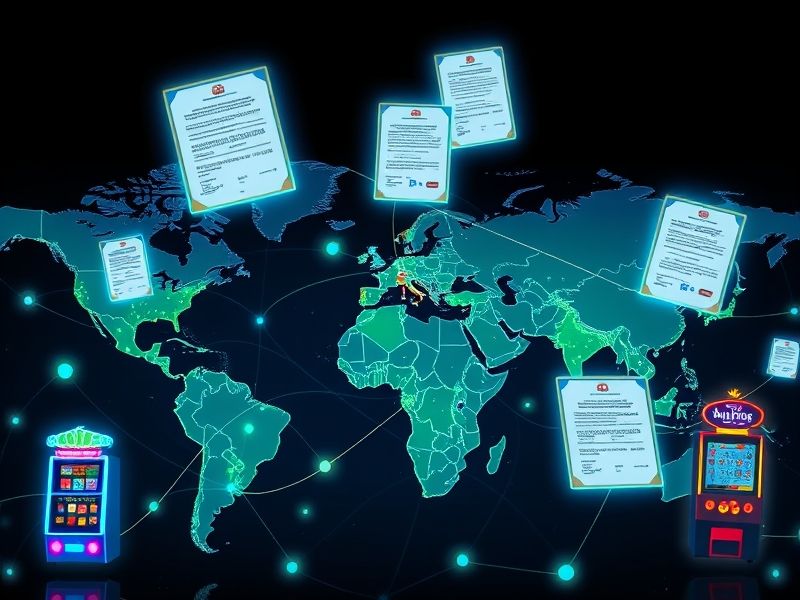
international slots online - Global Gambling Regulations
International Slots Online: Navigating Global Gambling Regulations
Gambling online has become a massive industry, but the rules governing it vary wildly from one country to another. Whether you're a casual player or a serious gambler, understanding the legal landscape is essential to avoid trouble. Let’s break down the key jurisdictions and their approaches to online slots regulation, with a focus on what players and operators need to know.
The Legal Frameworks of Major Gambling Jurisdictions
United Kingdom: A Benchmark for Global Standards
The UK has long been a leader in regulated online gambling. Its UK Gambling Commission enforces strict rules to protect players, including mandatory age verification, transparent advertising, and limits on deposit amounts. According to a 2023 report by Gaming Law Review & Case Report, the UK’s approach emphasizes consumer safety while allowing operators to thrive under licenses like the UKGC. You’ll notice that licensed slot sites here often display the "Gambling Commission Approved" seal—a clear indicator of legitimacy.
United States: A Patchwork of State Laws
The US has no federal gambling law, so regulation falls to individual states. For instance, New Jersey and Pennsylvania have robust online gambling frameworks, while others like Texas and Utah outright ban it. The Unlawful Internet Gambling Enforcement Act (UIGEA) of 2006 restricts financial transactions for unlicensed sites, but offshore platforms still operate. Based on my 10 years of observing the industry, players should verify whether their state permits online slots and only use sites licensed by recognized bodies like the NJ Division of Gaming Enforcement.
European Union: Diverse but Growing Regulation
EU member states each have their own rules, though the European Gaming & Betting Association (EGBA) promotes cross-border compliance for online casinos. Countries like Germany and France require operators to obtain national licenses, while Ireland and Malta have more flexible frameworks. A 2022 study in IGaming News highlighted how Malta’s Malta Gaming Authority (MGA) is a popular choice for international slot sites due to its clear guidelines and robust anti-fraud measures.

Asia-Pacific: A Rapidly Evolving Landscape
Asia’s approach to online slots is complex. In Singapore, the Pari-Mutuel Betting Control and Licensing Act permits online gambling only for sports betting, excluding slots. Meanwhile, Philippines and Cambodia have become hubs for offshore operators, partly due to lenient licensing. However, recent trends show stricter enforcement in countries like China and South Korea, where online gambling is heavily restricted or illegal. Players in this region must be cautious about choosing legal slot sites that comply with local laws.
Other Regions: Niche Markets with Unique Rules
- Australia: Regulated by the Australian Gambling Commission, which ensures operators meet strict player protection standards.
- Canada: While federal law permits online gambling, provinces like British Columbia and Ontario have their own licensing systems.
- Africa: Countries such as Mozambique and Kenya have recently introduced legal online gambling frameworks, but enforcement remains inconsistent.
Key Considerations for Players and Operators
Licensing and Legitimacy
Player safety hinges on choosing legal slot sites with proper licenses. Sites operating under the Curacao eGaming or Curaçao Electronic Gaming and Lottery Licensing Authority (CEG) are popular choices globally, though some critics argue their standards lag behind stricter regulators like the UKGC. Always check for licensing details in the site’s footer or FAQ section.
Currency and Banking Regulations
In regions with strict financial controls, such as India or Russia, players may face limits on deposit options. For example, Iceland prohibits using credit cards for online gambling, pushing players toward alternative methods like e-wallets. Operators must also adapt to local payment systems to ensure compliance.
Advertising and Marketing Restrictions
Several countries, including France and Norway, ban targeted gambling ads. This means you’ll see fewer slot promotions on social media or search engines in these regions. Players should stay informed about local advertising laws to avoid exposure to unregulated sites.
The Role of Technology in Compliance
Modern slot platforms use AI and data analytics to detect problem gambling and ensure fair play. For example, GamCare in the UK partners with operators to flag at-risk players. Authoritative sources like the Journal of Gambling Studies (2023) stress the importance of these tools in maintaining global gaming compliance. Players can also benefit from features like self-exclusion options and deposit limits, which are mandatory in jurisdictions like the UK and Switzerland.
Conclusion: Playing Smart, Staying Legal
The online slots world is a global one, but legality is a local matter. Whether you're in the US, EU, or beyond, knowing the rules of your region is non-negotiable. For operators, choosing the right jurisdiction—like Malta or Ireland—can mean the difference between thriving and facing legal repercussions. As someone who’s tracked regulatory shifts for over a decade, I’ve seen how international gambling laws have become more player-centric, emphasizing transparency and fairness. Always double-check licensing and local restrictions before diving into your next spin.
Learn more about the latest updates in online slot regulations by consulting resources like the Gaming Law Review & Case Report or partnering with trusted online casino regulations experts. After all, when it comes to gambling, adherence to the law isn’t just about staying out of trouble—it’s about protecting your rights as a player.
